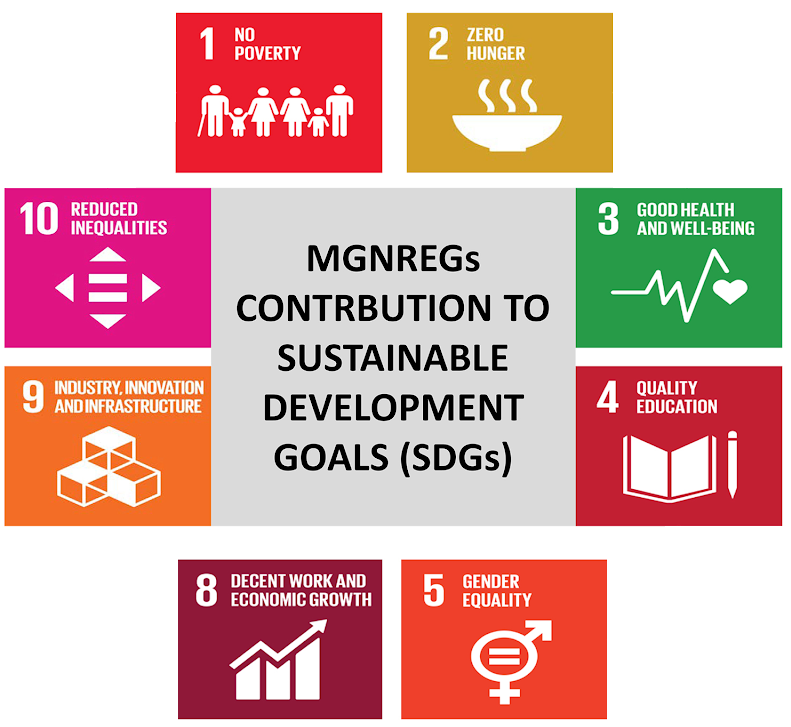Social Justice
MGNREGA and Migrant Crisis
- 23 May 2020
- 7 min read
This article is based on “Additional allocation for MGNREGA must be supplemented with steps to make it more effective” published in The Indian Express on 22/05/2020. It talks about the importance of MGNREGA (Mahatma Gandhi National Rural Employment Guarantee Act, 2005) during the economic crisis emanating from Covid-19 pandemic.
The virtual shutdown of all economic activities due to Covid-19 pandemic has resulted in a massive loss of livelihoods. Nearly 400-million workforce in the unorganised sector has been one of the worst affected sections of society.
Further, a significant part of this workforce has reverse migrated from cities to rural areas. In order to address this migrant crisis, the government has allocated an additional fund of Rs 40,000 crore for MGNREGA, as part of the stimulus package under Atma Nirbhar Bharat Abhiyan.
With nearly eight crore migrant workers returning to their villages and an additional allocation of funds could be a moment for the true revival of MGNREGA. However, in order to utilise the true potential of this scheme, there is a need to address the underlying challenges of MGNREGA.
Key Features of MGNREGA
- MGNREGA is one of the largest work guarantee programmes in the world.
- Objective: The primary objective of the scheme is to guarantee 100 days of employment in every financial year to adult members of any rural household willing to do public work-related unskilled manual work.
- Legal Right to Work: Unlike earlier employment guarantee schemes, the act aims at addressing the causes of chronic poverty through a rights-based framework.
- At least one-third of beneficiaries have to be women.
- Wages must be paid according to the statutory minimum wages specified for agricultural labourers in the state under the Minimum Wages Act, 1948.
- Demand-Driven Scheme: The most important part of MGNREGA’s design is its legally-backed guarantee for any rural adult to get work within 15 days of demanding it, failing which an ‘unemployment allowance’ must be given.
- This demand-driven scheme enables the self-selection of workers.
- Decentralised planning: There is an emphasis on strengthening the process of decentralisation by giving a significant role in Panchayati Raj Institutions (PRIs) in planning and implementing these works.
- The act mandates Gram sabhas to recommend the works that are to be undertaken and at least 50% of the works must be executed by them.
Underlying Challenges
- Inadequate Financing: This year’s allocation is the highest allocation for MGNREGA in any year since the passage of the law.
- However, the allocation amounts to 0.47% of the GDP continues to be much lower than the World Bank recommendations of 1.7% of GDP for the optimal functioning of the programme.
- Due to lack of funds, state governments find it difficult to meet the demand for employment under MGNREGA.
- Delay in Payment of wages: Most states have failed to disburse wages within 15 days as mandated by MGNREGA. In addition, workers are not compensated for a delay in payment of wages.
- This has turned the scheme into a supply-based programme and subsequently, workers had begun to lose interest in working under it.
- Ineffective Role of PRI: With very little autonomy, gram panchayats are not able to implement this act in an effective and efficient manner.
- Large Number of Incomplete works: There has been a delay in the completion of works under MGNREGA and inspection of projects has been irregular. Also, there is an issue of quality of work and asset creation under MGNREGA.
- Fabrication of Job cards: There are several issues related to the existence of fake job cards, the inclusion of fictitious names, missing entries and delays in making entries in job cards.
Way Forward
Short-Term Measures
- State governments must ensure that public work gets started in every village. Workers turning up at the worksite should be provided work immediately, without much delay.
- Local bodies must proactively reach out to returned and quarantined migrant workers and help those in need to get job cards.
- Adequate facilities such as soap, water, and masks for workers must be provided free of cost, at the worksite.
- At this time, there is a need to speed up the payments to MGNREGA workers. Preferably, cash needs to reach the workers easily and efficiently.
Long-Term Measures
- The pandemic has demonstrated the importance of decentralised governance.
- Gram panchayats need to be provided with adequate resources, powers, and responsibilities to sanction works, provide work on demand, and authorise wage payments to ensure there are no delays in payments.
- MGNREGA should be converged with other schemes of the government. For example, Green India initiative, Swachh Bharat Abhiyan etc.
- Social Auditing creates accountability of performance, especially towards immediate stakeholders. Hence, there is a need to to create awareness regarding government policies and measures in rural areas.
MGNREGA is a bottom-up, people-centred, demand-driven, self-selecting and rights-based programme. Thus, MGNREGA remains crucial for integrated resource management and livelihoods generation perspective.
|
Drishti Mains Question MGNREGA remains crucial for integrated resource management and livelihoods generation perspective. Comment. |
This editorial is based on ”Keeping the peace: On India-China border tension” which was published in The Hindu on May 22nd, 2020. Now watch this on our Youtube channel.





